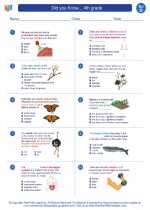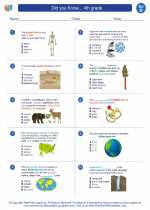Did you Know... 4th grade -> sustainability
Sustainability
Sustainability is the ability to maintain or uphold a certain process or state indefinitely. In the context of the environment, sustainability refers to the responsible use of resources to ensure that they are available for future generations. It involves finding a balance between meeting the needs of the present without compromising the ability of future generations to meet their own needs.
Key Concepts
- Environmental Impact: Understanding how human activities affect the environment and the consequences of these actions on natural resources.
- Resource Conservation: Managing and using resources in a way that ensures their availability for the long term.
- Renewable and Non-renewable Resources: Differentiating between resources that can be replenished over time and those that are finite.
- Waste Reduction: Minimizing waste generation and promoting recycling and reuse of materials.
- Ecological Footprint: Measuring the impact of human activities on the Earth's ecosystems and natural resources.
Study Guide
To understand sustainability, it's important to explore the following aspects:
- Types of Resources: Learn about renewable resources such as solar energy, wind energy, and water, as well as non-renewable resources like fossil fuels and minerals. Understand the differences in their availability and impact on the environment.
- Environmental Issues: Research and discuss environmental problems such as pollution, deforestation, habitat destruction, and climate change. Understand how these issues relate to sustainability and the long-term well-being of the planet.
- Conservation Practices: Explore methods of conserving resources, such as reducing energy consumption, practicing sustainable agriculture, and protecting biodiversity. Discuss the benefits of these practices for current and future generations.
- Case Studies: Investigate real-world examples of sustainable initiatives, such as eco-friendly buildings, renewable energy projects, and conservation efforts. Analyze their impact and effectiveness in promoting sustainability.
- Personal Actions: Reflect on individual choices that can contribute to sustainability, such as reducing waste, using public transportation, supporting local and organic products, and participating in environmental initiatives.
By exploring these topics and considering the interconnectedness of human activities and the natural world, you can gain a deeper understanding of sustainability and its significance for the future of our planet.
[Sustainability] Related Worksheets and Study Guides:
.◂Science Worksheets and Study Guides Fourth Grade. Did you Know... 4th grade
Study Guide Did you Know... 4th grade
Did you Know... 4th grade  Worksheet/Answer key
Worksheet/Answer key Did you Know... 4th grade
Did you Know... 4th grade  Worksheet/Answer key
Worksheet/Answer key Did you Know... 4th grade
Did you Know... 4th grade  Worksheet/Answer key
Worksheet/Answer key Did you Know... 4th grade
Did you Know... 4th grade 

 Worksheet/Answer key
Worksheet/Answer key
 Worksheet/Answer key
Worksheet/Answer key
 Worksheet/Answer key
Worksheet/Answer key

The resources above cover the following skills:
Core Ideas for Knowing Science
Life Science
Organisms are organized on a cellular basis and have a finite life span.